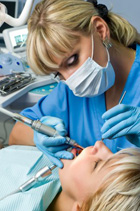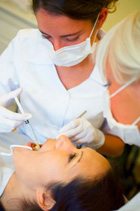 Gum disease and bad breath have this uncanny knack of becoming dance partners at a party you really shouldn’t be at in central Leeds. Generally in most people that suffer the indignity of having bad breath, it’s a direct fall-out of not caring for your teeth in the first place- bad oral hygiene. It all starts with the build up of plaque that gets into the gums and infects them. Then the mouth can start to dry around the teeth and then give off a pungent taste in the mouth and if it tastes bad, it sure isn’t going to give off a nice smell either. But there are other factors that can also impact on gum disease- diabetes, diet, stress and heavy medication. The thing is, the problem of bad breath can only be treated head on by also getting your dentist involved- they can tackle the gum disease and then advise you on how to suppress the problem when working on your teeth and gums at home. Oral hygiene should be of the highest order here, to give your mouth and gums a fighting chance- herbal remedies are wonderful for treating gum disease, but so too is ensuring that you maintain the saliva levels in the mouth by ensuring it is constantly in a flux of hydration; this will ensure that any bacteria is ‘destroyed’ naturally. This can also be done by changing your diet and identifying the symptoms behind your lifestyle which may be adding to the problem of your gum disease and hence, your bad breath.
Gum disease and bad breath have this uncanny knack of becoming dance partners at a party you really shouldn’t be at in central Leeds. Generally in most people that suffer the indignity of having bad breath, it’s a direct fall-out of not caring for your teeth in the first place- bad oral hygiene. It all starts with the build up of plaque that gets into the gums and infects them. Then the mouth can start to dry around the teeth and then give off a pungent taste in the mouth and if it tastes bad, it sure isn’t going to give off a nice smell either. But there are other factors that can also impact on gum disease- diabetes, diet, stress and heavy medication. The thing is, the problem of bad breath can only be treated head on by also getting your dentist involved- they can tackle the gum disease and then advise you on how to suppress the problem when working on your teeth and gums at home. Oral hygiene should be of the highest order here, to give your mouth and gums a fighting chance- herbal remedies are wonderful for treating gum disease, but so too is ensuring that you maintain the saliva levels in the mouth by ensuring it is constantly in a flux of hydration; this will ensure that any bacteria is ‘destroyed’ naturally. This can also be done by changing your diet and identifying the symptoms behind your lifestyle which may be adding to the problem of your gum disease and hence, your bad breath.





 After a hectic day of stress and anxiety in the city of Leeds, do you know how to chill-out when you get home? Have a hot bath, soft music, glass of wine, light-up some incense, soft music and a cup of herbal tea before a book at bedtime? Or do you find you’re just as anxious and angry as you have been all day when you hit the pillow? Because if you’re not relaxing properly, you may well find that you are grinding your teeth while you sleep. The symptoms to look out for here are aching and clicking jaws, neck and upper back and if you suffer from any of these, you are putting your health on the line, let alone wearing down the enamel on your teeth and leaving yourself open to tooth decay and gum disease. The point at where the jaws meet is a very delicate area that has to take the every day things you throw at it anyway, but what it doesn’t need is extra stress placed upon it from teeth grinding and if you fail to rectify the problem, it could let to some very expensive repair work on your teeth and surgery on your jaws. A dentist can help your teeth by prescribing a mouth-guard, but what is really essential is to get your stress and anger under control by seeking professional help from someone who can teach you stress management, and stop you from feeding your tension through your jaws, into your head and then down the neck into the upper back.
After a hectic day of stress and anxiety in the city of Leeds, do you know how to chill-out when you get home? Have a hot bath, soft music, glass of wine, light-up some incense, soft music and a cup of herbal tea before a book at bedtime? Or do you find you’re just as anxious and angry as you have been all day when you hit the pillow? Because if you’re not relaxing properly, you may well find that you are grinding your teeth while you sleep. The symptoms to look out for here are aching and clicking jaws, neck and upper back and if you suffer from any of these, you are putting your health on the line, let alone wearing down the enamel on your teeth and leaving yourself open to tooth decay and gum disease. The point at where the jaws meet is a very delicate area that has to take the every day things you throw at it anyway, but what it doesn’t need is extra stress placed upon it from teeth grinding and if you fail to rectify the problem, it could let to some very expensive repair work on your teeth and surgery on your jaws. A dentist can help your teeth by prescribing a mouth-guard, but what is really essential is to get your stress and anger under control by seeking professional help from someone who can teach you stress management, and stop you from feeding your tension through your jaws, into your head and then down the neck into the upper back. When we breathe at night, it’s done by the brain sending signals to the muscles that regulate the breathing. This also then leads onto the way the heart pushes blood and oxygen around the bloodstream. Central apnea however is the term used when the brain stops sending signals to these muscles and you stop breathing over and over again. It will normally occur in people in the city of Leeds that have had medical problems with the spine or that have had neurological problems in the passed that in some way, has interfered with the brainstem- with is the organ that deals with the muscles that control the breathing. Often term central sleep apnea, it can be very life threatening. Other than the causes already talked about, other causes of the disorder are obesity, people with problems associated with the spine such as Parkinson’s disease, arthritis, those who are on heavy medication and people with congestive heart disorders. The symptoms vary from fatigue, headaches when you wake and problems with sleeping, but treating it is complex is complex: the heart can be repaired, and dentists can supply devices to aid the breathing- some drugs are used too to help- but in people that have a damaged brainstem- it becomes difficult.
When we breathe at night, it’s done by the brain sending signals to the muscles that regulate the breathing. This also then leads onto the way the heart pushes blood and oxygen around the bloodstream. Central apnea however is the term used when the brain stops sending signals to these muscles and you stop breathing over and over again. It will normally occur in people in the city of Leeds that have had medical problems with the spine or that have had neurological problems in the passed that in some way, has interfered with the brainstem- with is the organ that deals with the muscles that control the breathing. Often term central sleep apnea, it can be very life threatening. Other than the causes already talked about, other causes of the disorder are obesity, people with problems associated with the spine such as Parkinson’s disease, arthritis, those who are on heavy medication and people with congestive heart disorders. The symptoms vary from fatigue, headaches when you wake and problems with sleeping, but treating it is complex is complex: the heart can be repaired, and dentists can supply devices to aid the breathing- some drugs are used too to help- but in people that have a damaged brainstem- it becomes difficult. It’s amazing when you look around Leeds just how many products there are on the market to keep up your oral hygiene program at home, and especially ones that promise to stave of bad breath. If you are someone who suffers from bad breath, you probably suffer from a lack of saliva in the mouth making it dry so probably, you’re first option to try to remedy the smell with a mouth wash- because that’s good for you and will, kill off bacteria in the mouth….or is it good for your mouth? Some of the cheaper mouthwashes contain alcohol which yes, is good for killing bacteria, but which also can dry the mouth out even more- adding to the problem of bad breath. They may also contain a masking agent, which dries your mouth out too and though your breath smells okay for a while afterwards- it does nothing to remedy the overall problem. If you are suffering from a dry mouth, you’d also be very wise to steer clear of toothpastes that whiten your teeth, for they contain bleaching agents that can compound your problem. What you need to do is seek advice from someone who can help with your problem and steer you away from products that will only make it worse- and the person best to do that is you dentist.
It’s amazing when you look around Leeds just how many products there are on the market to keep up your oral hygiene program at home, and especially ones that promise to stave of bad breath. If you are someone who suffers from bad breath, you probably suffer from a lack of saliva in the mouth making it dry so probably, you’re first option to try to remedy the smell with a mouth wash- because that’s good for you and will, kill off bacteria in the mouth….or is it good for your mouth? Some of the cheaper mouthwashes contain alcohol which yes, is good for killing bacteria, but which also can dry the mouth out even more- adding to the problem of bad breath. They may also contain a masking agent, which dries your mouth out too and though your breath smells okay for a while afterwards- it does nothing to remedy the overall problem. If you are suffering from a dry mouth, you’d also be very wise to steer clear of toothpastes that whiten your teeth, for they contain bleaching agents that can compound your problem. What you need to do is seek advice from someone who can help with your problem and steer you away from products that will only make it worse- and the person best to do that is you dentist. If you are aware that you sometimes suffer from bad breath, it can be very difficult to cope with. Social occasions become that much more difficult if you know that every time you open your mouth to speak, breathe or smile you are giving off unpleasant smells. Dentists can help put an end to this problem as they are able to examine your mouth, find the cause of your bad breath and then advise about how you might deal with it.
If you are aware that you sometimes suffer from bad breath, it can be very difficult to cope with. Social occasions become that much more difficult if you know that every time you open your mouth to speak, breathe or smile you are giving off unpleasant smells. Dentists can help put an end to this problem as they are able to examine your mouth, find the cause of your bad breath and then advise about how you might deal with it. Bad breath is clinically known as halitosis and is something that most of us have had to put up with in small doses every now and then. Eating dishes that are heavy on the garlic leaves the smell of garlic lingering in the mouth for some time and coffee tends to affect the odour of breath. Many people first thing in the morning find that their breath does not smell fragrant then either. But for some people the problem is more chronic than just occasionally having unpleasant breath.
Bad breath is clinically known as halitosis and is something that most of us have had to put up with in small doses every now and then. Eating dishes that are heavy on the garlic leaves the smell of garlic lingering in the mouth for some time and coffee tends to affect the odour of breath. Many people first thing in the morning find that their breath does not smell fragrant then either. But for some people the problem is more chronic than just occasionally having unpleasant breath. Thumb sucking is a natural thing when a child is born, in fact, it’s a common thing attributed to apes as well- that’s not to akin people from Leeds to apes! Even from within the womb, a baby tends to suck on anything it can, which is considered to be a desire to suckle on the breast when born- it’s even comforting to a child. But when it comes to the way the teeth grow, it can be exceedingly detrimental if the process is not nipped in the bud. Thumb sucking before the teeth start to appear is perfectly acceptable as it helps to break the teeth through the gums during these early days. But after that, it needs to be stopped. For a start, teeth at this stage of a person’s life are ambiguous in themselves as they are very suceptible to infection and tooth decay from the foods that are put into a mouth full of erupting teeth through gums. But the pressure put on the teeth and gums at this very delicate from the sucking process can cause the teeth to grow out of synch and produce unnecessary inflammation in the gums. This can also lead to early tooth decay, so to wean a child off this habit at this early stage, can only be healthy for their teeth in the long term future.
Thumb sucking is a natural thing when a child is born, in fact, it’s a common thing attributed to apes as well- that’s not to akin people from Leeds to apes! Even from within the womb, a baby tends to suck on anything it can, which is considered to be a desire to suckle on the breast when born- it’s even comforting to a child. But when it comes to the way the teeth grow, it can be exceedingly detrimental if the process is not nipped in the bud. Thumb sucking before the teeth start to appear is perfectly acceptable as it helps to break the teeth through the gums during these early days. But after that, it needs to be stopped. For a start, teeth at this stage of a person’s life are ambiguous in themselves as they are very suceptible to infection and tooth decay from the foods that are put into a mouth full of erupting teeth through gums. But the pressure put on the teeth and gums at this very delicate from the sucking process can cause the teeth to grow out of synch and produce unnecessary inflammation in the gums. This can also lead to early tooth decay, so to wean a child off this habit at this early stage, can only be healthy for their teeth in the long term future. Ankylosis is one of those conditions in the city of Leeds, that you may well never have heard of before but may well have been a victim of. In the natural order of things, our teeth tend to grow healthy, and as a child, we start to lose our teeth, and a natural process will kick in where the baby teeth will dissolve allowing the new teeth to come through. However, in the real world of teeth, it isn’t always that easy and the fresh ligaments that protect the teeth may dry up and cause problems in the mouth because of complications which can be congenital or the constant pressure from the tongue. Teeth also grow at different rates which the mouth simply fails to keep up with and so there is a high risk of infection. But in adults, there can be a similar threat to the health of the mouth if a tooth suffers from injury and the ligaments cannot recover. The roots may require root canal treatment and a crown to save the tooth. One of the many studies of how the natural growth related between the gums and teeth has also been defined by diet and ankylosis has been linked to the calcium deficiency in third world countries. Constant appointments with a dentist from the moment the baby teeth start show all the way up to adulthood can monitor the way the teeth are affected by such problems and the earlier the issue related between the teeth and gums is diagnosed, the quicker the teeth can be treated.
Ankylosis is one of those conditions in the city of Leeds, that you may well never have heard of before but may well have been a victim of. In the natural order of things, our teeth tend to grow healthy, and as a child, we start to lose our teeth, and a natural process will kick in where the baby teeth will dissolve allowing the new teeth to come through. However, in the real world of teeth, it isn’t always that easy and the fresh ligaments that protect the teeth may dry up and cause problems in the mouth because of complications which can be congenital or the constant pressure from the tongue. Teeth also grow at different rates which the mouth simply fails to keep up with and so there is a high risk of infection. But in adults, there can be a similar threat to the health of the mouth if a tooth suffers from injury and the ligaments cannot recover. The roots may require root canal treatment and a crown to save the tooth. One of the many studies of how the natural growth related between the gums and teeth has also been defined by diet and ankylosis has been linked to the calcium deficiency in third world countries. Constant appointments with a dentist from the moment the baby teeth start show all the way up to adulthood can monitor the way the teeth are affected by such problems and the earlier the issue related between the teeth and gums is diagnosed, the quicker the teeth can be treated. When we pack down for the night in central Leeds, the body goes into automatic and the heart, the brain and the lungs take over. All of these three units work together to regulate the breathing as you sleep. However, if there is a blockage somewhere down the line, especially in the mouth, these three start to work in an irregular fashion that makes the breathing intermittent; snoring is one of the side effects. Dentists are well aware of this problem because they realise what the overall downside is. Keeping your teeth free from gum disease prevents poisoning of the heart and allows you to sleep peacefully. But that’s not the only way to fight this problem- sleep apnea works in mysterious ways. It can cause breathing to become so irregular, it can give you a terrible night’s sleep. And the way you wake too can affect the heart as you pull out of the sleep. Over a sustained period of time, all of the major three units will start to operate dysfunction ally causing a total brake down in the sleep pattern and then your health will deteriorate,: poor sleep will show itself through stress and mood swings. Other than keeping yourself healthy and once the problem has been identified, your dentist will prescribe devices to wear at night to support the flow of air to the lungs. If this fails to work, an operation may be required.
When we pack down for the night in central Leeds, the body goes into automatic and the heart, the brain and the lungs take over. All of these three units work together to regulate the breathing as you sleep. However, if there is a blockage somewhere down the line, especially in the mouth, these three start to work in an irregular fashion that makes the breathing intermittent; snoring is one of the side effects. Dentists are well aware of this problem because they realise what the overall downside is. Keeping your teeth free from gum disease prevents poisoning of the heart and allows you to sleep peacefully. But that’s not the only way to fight this problem- sleep apnea works in mysterious ways. It can cause breathing to become so irregular, it can give you a terrible night’s sleep. And the way you wake too can affect the heart as you pull out of the sleep. Over a sustained period of time, all of the major three units will start to operate dysfunction ally causing a total brake down in the sleep pattern and then your health will deteriorate,: poor sleep will show itself through stress and mood swings. Other than keeping yourself healthy and once the problem has been identified, your dentist will prescribe devices to wear at night to support the flow of air to the lungs. If this fails to work, an operation may be required. Your dentist has all sorts of things to look out for in your mouth when you go and see him or her for your six month check up. Things like tooth decay and gum disease are obvious but many people don’t know that dentists can also spot the signs of sleep apnea, a debilitating condition which interrupts sleep. Read on to find out more information about it.
Your dentist has all sorts of things to look out for in your mouth when you go and see him or her for your six month check up. Things like tooth decay and gum disease are obvious but many people don’t know that dentists can also spot the signs of sleep apnea, a debilitating condition which interrupts sleep. Read on to find out more information about it.

